- Home
- W. Somerset Maugham
Selected Masterpieces Page 3
Selected Masterpieces Read online
Page 3
"Can't I? You wait and see."
"All right then. Bring me a double dry Martini," said Frank.
"Bring three double dry Martinis," said Beatrice.
They were brought and drunk at a gulp. The women looked at one another and sighed. The misunderstanding of the last fortnight dissolved and the sincere affection each had for the other welled up again in their hearts. They could hardly believe that they had ever contemplated the possibility of severing a friendship that had brought them so much solid satisfaction. They finished the potatoes.
"I wonder if they've got any chocolate eclairs," said Beatrice.
"Of course they have."
And of course they had. Frank thrust one whole into her huge mouth, swallowed it and seized another, but before she ate it she looked at the other two and plunged a vindictive dagger into the heart of the monstrous Lena.
"You can say what you like, but the truth is she played a damned rotten game of bridge, really."
"Lousy," agreed Arrow.
But Beatrice suddenly thought she would like a meringue.
The Alien Corn
I had known the Blands a long time before I discovered that they had any connexion with Ferdy Rabenstein. Ferdy must have been nearly fifty when I first knew him and at the time of which I write he was well over seventy. He had altered little. His hair, coarse but abundant and curly, was white, but he had kept his figure and held himself as gallantly as ever. It was not hard to believe that in youth he had been as beautiful as people said. He had still his fine Semitic profile and the lustrous black eyes that had caused havoc in so many a Gentile breast. He was very tall, lean, with an oval face and a clear skin. He wore his clothes very well and in evening dress, even now, he was one of the handsomest men I had ever seen. He wore then large black pearls in his shirt-front and platinum and sapphire rings on his fingers. Perhaps he was rather flashy, but you felt it was so much in character that it would have ill become him to be anything else.
'After all, I am an Oriental,' he said. 'I can carry a certain barbaric magnificence.'
I have often thought that Ferdy Rabenstein would make an admirable subject for a biography. He was not a great man, but within the limits he set himself he made of his life a work of art. It was a masterpiece in little, like a Persian miniature, and" derived its interest from its perfection. Unfortunately the materials are scanty. They would consist of letters that may very well have been destroyed and the recollection of people who are old now and will soon be dead. His memory is extraordinary, but he would never write his memoirs, for he looks upon his past as a source of purely private entertainment; and he is a man of the most perfect discretion. Nor do I know anyone who could do justice of the subject but Max Beerbohm. There is no one else in this hard world of today who can look upon the trivial with such tender sympathy and wring such a delicate pathos from futility. I wonder that Max, who must have known Ferdy much better than I, and long before, was never tempted to exercise his exquisite fancy on such a theme. He was born for Max to write about. And who should have illustrated the elegant book that I see in my mind's eye but Aubrey Beardsley? Thus would have been erected a monument of triple brass and the ephemera imprisoned to succeeding ages in the amber's translucency.
Ferdy's conquests were social and his venue was the great world. He was born in South Africa and did not come to England till he was twenty. For some time he was on the Stock Exchange, but on the death of his father he inherited a considerable fortune, and retiring from business devoted himself to the life of a man about town. At that period English society was still a closed body and it was not easy for a Jew to force its barriers, but to Ferdy they fell like the walls of Jericho. He was handsome, he was rich, he was a sportsman and he was good company. He had a house in Curzon Street, furnished with the most beautiful French furniture, and a French chef, and a brougham. It would be interesting to know the first steps in his wonderful career: they are lost in the dark abysm of time. When I first met him he had been long established as one of the smartest men in London: this was at a very grand house in Norfolk to which I had been asked as a promising young novelist by the hostess who took an interest in letters, but the company was very distinguished and I was overawed. We were sixteen, and I felt shy and alone among these Cabinet Ministers, great ladies, and peers of the realm who talked of people and things of which I knew nothing. They were civil to me, but indifferent, and I was conscious that I was somewhat of a burden to my hostess. Ferdy saved me. He sat with me, walked with me, and talked with me. He discovered that I was a writer and we discussed the drama and the novel; he learnt that I had lived much on the Continent and he talked to me pleasantly of France, Germany, and Spain. He seemed really to seek my society. He gave me the flattering impression that he and I stood apart from the other members of the company and by our conversation upon affairs of the spirit made that of the rest of them, the political situation, the scandal of somebody's divorce, and the growing disinclination of pheasants to be killed, 34 seem a little ridiculous. But if Ferdy had at the bottom of his heart a feeling of ever so faint a contempt for the hearty British gentry that surrounded us I am sure that it was only to me that he allowed an inkling of it to appear, and looking back I cannot but wonder whether it was not after all a suave and very delicate compliment that he paid me. I think of course that he liked to exercise his charm and I dare say the obvious pleasure his conversation gave me gratified him, but he could have had no motive for taking so much trouble over an obscure novelist other than his real interest in art and letters. I felt that he and I at bottom were equally alien in that company, I because I was a writer and he because he was a Jew, but I envied the ease with which he bore himself. He was completely at home. Everyone called him Ferdy. He seemed to be always in good spirits. He was never at a loss for a quip, a jest, or a repartee. They liked him in that house because he made them laugh, but never made them uncomfortable by talking over their heads. He brought a faint savour of Oriental romance into their lives, but so cleverly that they only felt more English. You could never be dull when he was by and with him present you were safe from the fear of the devastating silences that sometimes overwhelm a British company. A pause looked inevitable and Ferdy Rabenstein had broken into a topic that interested everyone. An invaluable asset to any party. He had an inexhaustible fund of Jewish stories. He was a very good mimic and he assumed the Yiddish accent and reproduced the Jewish gestures to perfection; his head sank into his body, his face grew cunning, his voice oily, and he was a rabbi or an old clothes merchant or a smart commercial traveller or a fat procuress in Frankfort. It was as good as a play. Because he was himself a Jew and insisted on it you laughed without reserve, but for my own part not without an under-current of discomfort. I was not quite sure of a sense of humour that made such cruel fun of his own race. I discovered afterwards that Jewish stories were his speciality and I seldom met him anywhere without hearing him tell sooner or later the last he had heard.
But the best story he told me on this occasion was not a Jewish one. It struck me so that I have never forgotten it, but for one reason or another I have never had occasion to tell it again. I give it here because it is a curious little incident concerning persons whose names at least will live in the social history of the Victorian Era and I think it would be a pity if it were lost. He told me then that once when quite a young man he was staying in the country in a house where Mrs Langtry, at that time at the height of her beauty and astounding reputation, was also a guest. It happened to be within driving distance of that in which lived the Duchess of Somerset, who had been Queen of Beauty at the Eglinton Tournament, and knowing her slightly, it occurred to him that it would be interesting to bring the two 36 women together. He suggested it to Mrs Langtry, who was willing, and forthwith wrote to the Duchess asking if he might bring the celebrated beauty to call on her. It was fitting, he said, that the loveliest woman of this generation (this was in the eighties) should pay her respects to the loveliest woman of the last. 'B
ring her by all means,' answered the Duchess, 'but I warn you that it will be a shock to her.' They drove over in a carriage and pair, Mrs Langtry in a close-fitting blue bonnet with long satin strings, which showed the fine shape of her head and made her blue eyes even bluer, and were received by a little ugly old hag who looked with irony out of her beady eyes at the radiant beauty who had come to see her. They had tea, they talked, and they drove home again. Mrs Langtry was very silent and when Ferdy looked at her he saw that she was quietly weeping. When they got back to the house she went to her room and would not come down to dinner that night. For the first time she had realized that beauty dies.
Ferdy asked me for my address and a few days after I got back to London invited me to dinner. There were only six of us, an American woman married to an English peer, a Swedish painter, an actress, and a well-known critic. We ate very good food and drank excellent wine. The conversation was easy and intelligent. After dinner Ferdy was persuaded to play the piano. He only played Viennese waltzes, I discovered later that they were his speciality, and the Ught, tuneful, and sensual music seemed to accord well with his discreet flamboyance. He played without affectation, with a lilt, and he had a graceful touch. This was the first of a good many dinners I had with him, he would ask me two of three times a year, and as time passed I met him more and more frequently at other people's houses. I rose in the world and perhaps he came down a little. Of late years I had sometimes found him at parties where other Jews were and I fancied that I read in his shining liquid eyes, resting for a moment on these members of his race, a certain good-natured amusement at the thought of what the world was coming to. There were people who said he was a snob, but do not think he was; it just happened that in his early days he had never met any but the great. He had a real passion for art and in his commerce with those that produced it was at his best. With them he had never that faint air of persiflage which when he was with very grand persons made you suspect that he was never quite the dupe of their grandeur. His taste was perfect and many of his friends were glad to avail themselves of his knowledge. He was one of the first to value old furniture and he rescued many a priceless piece from the attics of ancestral mansions and gave it an honourable place in the drawing-room. It amused him to saunter round the auction rooms and he was always willing to give his advice to great ladies who 38 desired at once to acquire a beautiful thing and make a profitable investment. He was rich and good-natured. He liked to patronize the arts and would take a great deal of trouble to get commissions for some young painter whose talent he admired or an engagement to play at a rich man's house for a violinist who could in no other way get a hearing. But he never let his rich man down. His taste was too good to deceive and civil though he might be to the mediocre he would not lift a finger to help them. His own musical parties, very small and carefully chosen, were a treat. He never married.
'I am a man of the world,' he said, 'and I flatter myself that I have no prejudices, tous les gouts sont dans la nature, but I do not think I could bring myself to marry a Gentile. There's no harm in going to the opera in a dinner jacket, but it just would never occur to me to do so.'
'Then why didn't you marry a Jewess?'
(I did not hear this conversation, but the lively and audacious creature who thus tackled him told me of it.)
'Oh, my dear, our women are so prolific. I could not bear the thought of peopling the world with a little Ikey and a little Jacob and a little Rebecca and a little Leah and a little Rachel.'
But he had had affairs of note and the glamour of past romance still clung to him. He was in his youth of an amorous complexion. I have met old ladies who told me that he was irresistible, and when in reminiscent mood they talked to me of this woman and that who had completely lost her head over him, I divined that, such was his beauty, they could not find it in their hearts to blame them. It was interesting to hear of great ladies that I had read of in the memoirs of the day or had met as respectable dowagers garrulous over their grandsons at Eton or making a mess of a hand at bridge and bethink myself that they had been consumed with sinful passion for the handsome Jew. Ferdy's most notorious amour was with the Duchess of Hereford, the loveliest, the most gallant and dashing of the beauties of the end of Queen Victoria's reign. It lasted for twenty years. He had doubtless flirtations meanwhile, but their relations were stable and recognized. It was proof of his marvellous tact that when at last they ended he exchanged an ageing mistress for a loyal friend. I remember meeting the pair not so very long ago at luncheon. She was an old woman, tall and of a commanding presence, but with a mask of paint on a ravaged face. We were lunching at the Carlton and Ferdy, our host, came a few minutes late. He offered us a cocktail and the Duchess told him we had already had one.
'Ah, I wondered why your eyes were so doubly bright,' he said.
The old raddled woman flushed with pleasure.
My youth passed, I grew middle-aged, I wondered how soon I must begin to describe myself as elderly; I wrote books and plays, I travelled, I underwent experiences, I fell in love and out of it; and still I kept meeting Ferdy at parties. War broke out and was waged, millions of men were killed, and the face of the world was changed. Ferdy did not like the war. He was too old to take part in it, and his German name was awkward, but he was discreet and took care not to expose himself to humiliation. His old friends were faithful to him and he lived in a dignified but not too strict seclusion. But then peace came and with courage he set himself to making the best of changed conditions. Society was mixed now, parties were rowdy, but Ferdy fitted himself to the new life. He still told his funny Jewish stories, he still played charmingly the waltzes of Strauss, he still went round auction rooms and told the new rich what they ought to buy. I went to live abroad, but whenever I was in London I saw Ferdy and now there was something a little uncanny in him. He did not give in. He had never known a day's illness. He seemed never to grow tired. He still dressed beautifully. He was interested in everybody. His mind was alert and people asked him to dinner, not for old times' sake, but because he was worth his salt. He still gave charming little concerts at his house in Curzon Street.
It was when he invited me to one of these that I made the discovery that started the recollections of him I have here set down. We were dining at a house in Hill Street, a large party, and the women having gone upstairs Ferdy and I found ourselves side by side. He told me that Lea Makart was coming to play for him on the following Friday evening and he would be glad if I would come.
'I'm awfully sorry,' I said, 'but I'm going down to the Blands.'
'What Blands?'
'They live in Sussex at a place called Tilby.'
'I didn't know you knew them.'
He looked at me rather strangely. He smiled. I didn't know what amused him.
'Oh, yes, I've known them for years. It's a very nice house to stay at.'
'Adolf is my nephew.'
'Sir Adolphus?'
'It suggests one of the bucks of the Regency, doesn't it? But I will not conceal from you that he was named Adolf.'
'Everyone I know calls him Freddy.'
'I know, and I understand that Miriam, his wife, only answers to the name of Muriel.'
'How does he happen to be your nephew?'
'Because Hannah Rabenstein, my sister, married Alfons Bleikogel, who ended life as Sir Alfred Bland, first Baronet, and Adolf, their only son, in due course became Sir Adolphus Bland, second Baronet'
'Then Freddy Bland's mother, the Lady Bland who lives in Portland Place, is your sister?'
'Yes, my sister Hannah. She was the eldest of the family. She's eighty, but in full possession of her faculties and a remarkable woman.'
'I've never met her.'
'I think your friends the Blands would just as soon you didn't. She has never lost her German accent.'
'Do you never see them?' I asked.
'I haven't spoken to them for twenty years. I am such a Jew and they are so English.' He smiled. 'I could never remember that thei
r names were Freddy and Muriel. I used to come out with an Adolf or a Miriam at awkward moments. And they didn't like my stories. It was better that we should not meet. When the war broke out and I would not change my name it was the last straw. It was too late, I could never have accustomed my friends to think of me as anything but Ferdy Rabenstein; I was quite content. I was not ambitious to be a Smith, a Brown, or a Robinson.'
Though he spoke facetiously, there was in his tone the faintest possible derision and I felt, hardly felt even, the sensation was so shadowy, that, as it had often vaguely seemed to me before, there was in the depth of his impenetrable heart a cynical contempt for the Gentiles he had conquered.
'Then you don't know the two boys?' I said.
'No.'
'The eldest is called George, you know. I don't think he's so clever as Harry, the other one, but he's an engaging youth. I think you'd like him.'
'Where is he now?'
'Well, he's just been sent down from Oxford. I suppose he's at home. Harry's still at Eton.'
'Why don't you bring George to lunch with me?'
'I'll ask him. I should think he'd love to come.'
'It has reached my ears that he's been a little troublesome.'
'Oh, I don't know. He wouldn't go into the army, which is what they wanted. They rather fancied the Guards. And so he went to Oxford instead. He didn't work and he spent a great deal of money and he painted the town red. It was all quite normal.'
'What was he sent down for?'
'I don't know. Nothing of any consequence.'
At that moment our host rose and we went upstairs. When Ferdy bade me good night he asked me not to forget about his great-nephew.
'Ring me up,' he said. 'Wednesday would suit me. Or Friday.'
Next day I went down to Tilby. It was an Elizabethan mansion standing in a spacious park, in which roamed fallow deer, and from its windows you had wide views of rolling downs. It seemed to me that as far as the eye could reach the land belonged to the Blands. His tenants must have found Sir Adolphus a wonderful landlord, for I never saw farms kept in such order, the barns and cow-sheds were spick and span and the pigsties were a picture; the public-houses looked like Old English water-colours and the cottages he had built on the estate combined admirably picturesqueness and convenience. It must have cost him a pot of money to run the place on these lines. Fortunately he had it. The park with its grand old trees (and its nine-hole golf course) was tended like a garden, and the wide-stretching gardens were the pride of the neighbourhood. The magnificent house, with its steep roofs and mul-lioned windows, had been restored by the most celebrated architect in England and furnished by Lady Bland, with taste and knowledge, in a style that perfectly fitted it.

 The Skeptical Romancer: Selected Travel Writing
The Skeptical Romancer: Selected Travel Writing The Summing Up
The Summing Up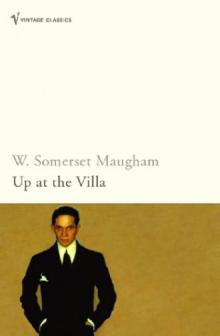 Up at the Villa
Up at the Villa The Razor's Edge
The Razor's Edge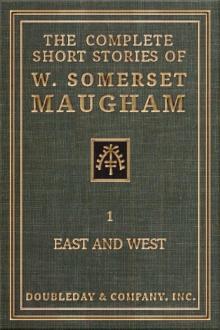 The Complete Short Stories of W. Somerset Maugham: East and West (Vol. 1 of 2))
The Complete Short Stories of W. Somerset Maugham: East and West (Vol. 1 of 2))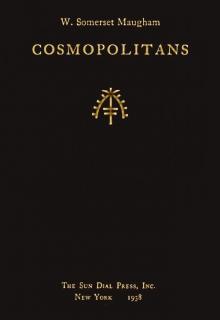 Cosmopolitans
Cosmopolitans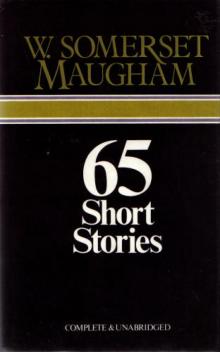 65 Short Stories
65 Short Stories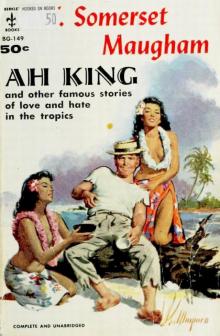 Ah King (Works of W. Somerset Maugham)
Ah King (Works of W. Somerset Maugham) Collected Short Stories: Volume 1
Collected Short Stories: Volume 1 Collected Short Stories Volume 2
Collected Short Stories Volume 2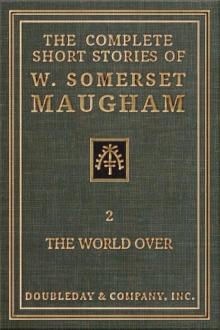 The Complete Short Stories of W. Somerset Maugham - II - The World Over
The Complete Short Stories of W. Somerset Maugham - II - The World Over Collected Short Stories Volume 4
Collected Short Stories Volume 4 Theatre
Theatre Short Stories
Short Stories Then and Now
Then and Now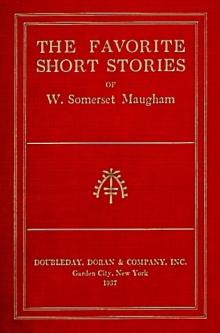 The Favorite Short Stories of W. Somerset Maugham
The Favorite Short Stories of W. Somerset Maugham Of Human Bondage
Of Human Bondage The Magician
The Magician The Great Exotic Novels and Short Stories of Somerset Maugham
The Great Exotic Novels and Short Stories of Somerset Maugham A Writer's Notebook
A Writer's Notebook Christmas Holiday
Christmas Holiday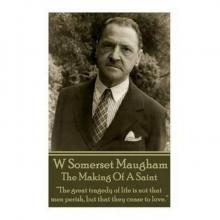 The Making of a Saint
The Making of a Saint Merry Go Round
Merry Go Round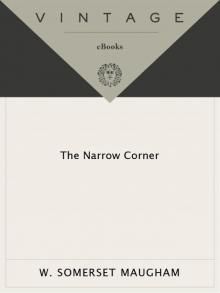 The Narrow Corner
The Narrow Corner Collected Short Stories Volume 3
Collected Short Stories Volume 3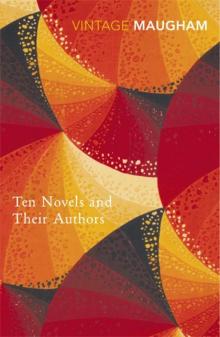 Ten Novels and Their Authors
Ten Novels and Their Authors Ashenden
Ashenden The Moon and Sixpence
The Moon and Sixpence Cakes and Ale
Cakes and Ale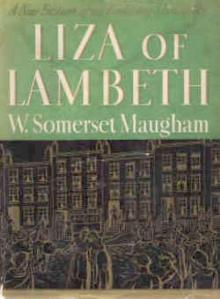 Liza of Lambeth
Liza of Lambeth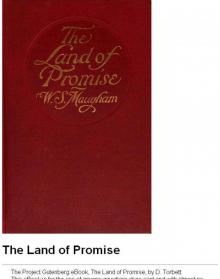 The Land of Promise: A Comedy in Four Acts (1922)
The Land of Promise: A Comedy in Four Acts (1922) A Writer's Notebook (Vintage International)
A Writer's Notebook (Vintage International)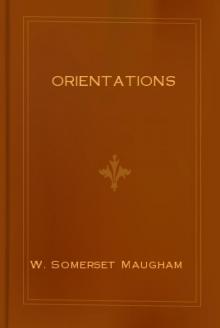 Orientations
Orientations Selected Masterpieces
Selected Masterpieces Mrs Craddock
Mrs Craddock The Skeptical Romancer
The Skeptical Romancer On a Chinese Screen
On a Chinese Screen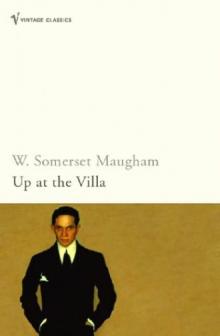 (1941) Up at the Villa
(1941) Up at the Villa The Great Novels and Short Stories of Somerset Maugham
The Great Novels and Short Stories of Somerset Maugham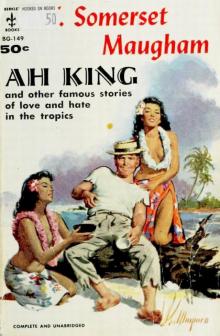 Ah King
Ah King The Explorer
The Explorer The Skeptical Romancer: Selected Travel Writing (Vintage Departures)
The Skeptical Romancer: Selected Travel Writing (Vintage Departures)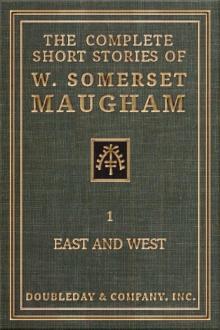 The Complete Short Stories of W. Somerset Maugham - I - East and West
The Complete Short Stories of W. Somerset Maugham - I - East and West